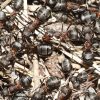 Ramzi bin al-Shibh was declared unfit to stand trial after being accused of helping the 9/11 mastermind
Ramzi bin al-Shibh was declared unfit to stand trial after being accused of helping the 9/11 mastermind
The man accused A 9/11 mastermind was found unfit to stand trial after years of CIA torture left him with post-traumatic stress disorder and psychosis.
Ramzi bin al-Shibh, 51, was one of them. of five defendants facing the death penalty on charges that he helped plot the 2001 terrorist attacks that killed nearly 3,000 people.
After his arrest in Pakistan in 2002, bin al-Shibh was held for years in CIA-controlled facilities, during which time he was chained naked to the ceiling, forced to stand without sleep for three days, and kept in prefabricated cells, according to The New York Times, on springs to keep prisoners balanced.< /p>
David Brooke, Mr. bin al-Shibh's lawyer, claims CIA torture has left the Yemeni prisoner «mad,» the newspaper reported.
The defendant is accused of helping organize an al-Qaeda cell in Hamburg, Germany, that hijacked one of the two passenger planes that crashed into the World Trade Center in New York.
Last month he was diagnosed with post-traumatic stress disorder. stress disorder (PTSD) with secondary psychotic features.
On Thursday, more than two decades after the attacks, Judge Col. Matthew N. McCall disqualified Mr. bin al-Shibh from a conspiracy case involving four other defendants.< /p>
“The totality of the facts demonstrates a defendant who «is completely focused on his delusions,» Colonel McCall wrote.
«Time and time again he focuses his lawyer's work on stopping his delusional prosecution, (which) demonstrates a deterioration in his ability to assist in his defense.»
 Artist Janet Hamlin's courtroom sketch depicts a 9/11 accomplice. Ramzi bin al-Shibh at a hearing before a military commission at the US Naval Base at Guantanamo Bay. Photo: AFP/JANET HAMLIN
Artist Janet Hamlin's courtroom sketch depicts a 9/11 accomplice. Ramzi bin al-Shibh at a hearing before a military commission at the US Naval Base at Guantanamo Bay. Photo: AFP/JANET HAMLIN
Chicago lawyer Thomas Durkin, who previously represented Mr bin al-Shibh, told The Telegraph he raised the issue of his mental health at the initial arraignment in July 2008.
“The most outrageous thing is that he should have been immediately removed from this case. He clearly suffered from post-traumatic stress disorder and psychosis. He would have had angry outbursts in court,” he said.
“He was literally chained to the floor of the courtroom. He was the only one, the others were not chained at all,” added Mr. Durkin.
“He clearly suffered from the consequences of torture. It was extremely difficult to communicate with him.
“I think it is commendable that at least this judge had the courage to confront the obvious.”
Prosecutors urged the judge to dismiss the lawsuit. On August 24, Mr. bin al-Shibh was determined to have a “mental disease or defect” that renders him “incapable of understanding the nature of the proceedings against him or of cooperating reasonably” with his legal team.
< p>The defendant complained for years that he was attacked by invisible forces that caused his bed to vibrate and sting his genitals, depriving him of sleep.
“Complex delusions and hallucinations”
Mr Brooke told the judge on Tuesday his client's «complex delusions and hallucinations are pervasive» in legal meetings.
To improve Mr bin al-Shibh's condition, he said, «it is necessary to treat him post-traumatic stress disorder. Until that happens, things won't get better.»
Pre-trial proceedings were due to continue Friday for Khalid Sheikh Mohammed, accused of masterminding the plot, and three other defendants.
«That's no longer possible,» Mr Brooke said. said Thursday night, denying that the CIA's «torture program has caused profound harm to the people subjected to it.»
He added that although the board found Mr. bin al-Shibh unfit in August, «there is now his condition is nothing new.”
“He was like this all the time,” Mr. Brooke said. “It took so long to admit it.”
In 2008, a military medical board said bin al-Shibh may have a “severe mental illness,” and in 2009, prosecutors told the court that he takes «various psychotropic medications used to treat schizophrenia and/or bipolar disorder.»
Mr. bin al-Shibh wanted to die during the 9/11 attacks but did not have the opportunity, according to the source 9/. 11 Commission Report.
He applied repeatedly for a U.S. visa but was denied and instead became the alleged key link between hijacker Mohammed Atta and the al-Qaeda leadership in Afghanistan.


























































Свежие комментарии